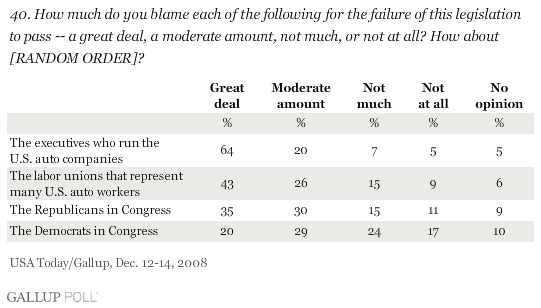PRINCETON, NJ -- Executives of the U.S. auto industry take the brunt of public criticism for the failure of Congress to pass an auto bailout package last week, with 64% of Americans saying the auto executives deserve a great deal of the blame. However, the unions representing U.S. autoworkers are next in line, faulted by 43% of Americans -- more than the 35% who blame the Republicans in Congress.
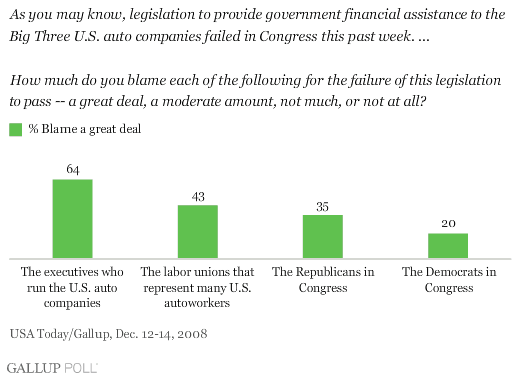
Only 20% of Americans blame the failure of the auto bailout bill on the Democrats in Congress -- most of whom voted for the $14 billion aid package for the Big Three U.S. auto manufacturers.
This is according to a Dec. 12-14 USA Today/���۴�ýpoll, conducted in the first few days after an auto bailout agreement reached between congressional Democrats and the Bush administration fell apart on a procedural vote in the U.S. Senate on Dec. 11.
Split Decision on Bailout Vote
According to the same survey, Americans are about evenly divided over the merits of the failed bailout package: 47% say they would rather have seen the legislation pass, while 46% preferred that it fail.
Most Democrats support the auto bailout, while most Republicans and half of independents oppose it.
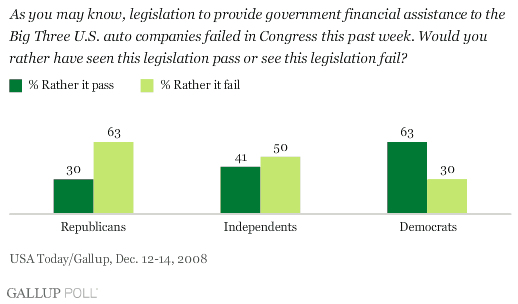
In a follow-up question, most of those who wanted the plan to fail -- representing about a third of all Americans -- said they oppose the government's providing any sort of bailout package for the auto companies. However, a smaller number, representing 14% of all Americans, say they support a bailout, just not the particular plan that came to a vote.
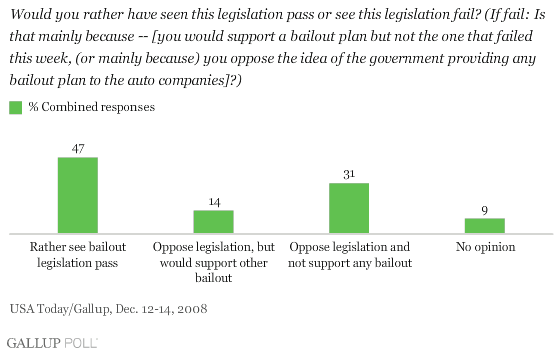
Thus, in total, 61% of Americans favor some sort of government help for the auto industry.
Unions vs. the Republicans
That most Americans assign a high degree of blame to auto industry executives for the auto bailout's demise may not be surprising given the substantial negative publicity surrounding the way these executives handled their initial appearances before Congress leading up to the vote -- both their arrival by private jet and their failure to have a business plan for using the bailout money. This seems to be reflected in the fact that large majorities of Republicans, independents, and Democrats fault the executives a great deal for the bill's failure.
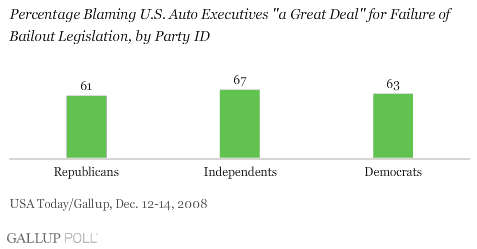
It is somewhat more intriguing that Americans blame the autoworker unions to a greater extent than the Republicans in Congress, as the last-minute collapse of the bill was widely reported as occurring on the basis of the auto unions' failing to yield to Republican demands for more wage concessions.
Among the partisan groups, rank-and-file Republicans are the most critical of the auto unions, with 59% saying they bear a great deal of blame for the bailout's demise -- similar to the degree to which they blame the auto executives. Only 23% of Republicans blame the Republicans in Congress. However, political independents are also much more likely to blame the auto unions than the Republicans, 41% to 29%. Democrats, by contrast, see things the other way, with more blaming the Republicans than the unions, 48% to 35%.
The Democrats in Congress receive little blame from all three parties.
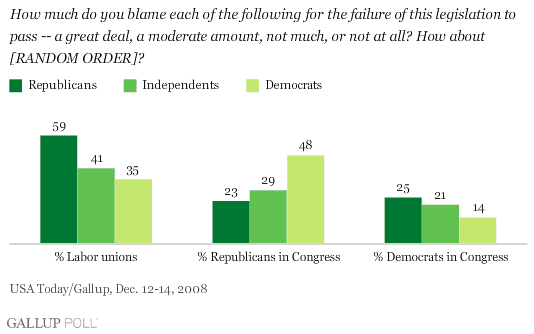
Earlier this month, ���۴�ýfound less public criticism of the autoworker unions with respect to culpability for the financial problems that the three major U.S. auto companies face. In a Dec. 4-7 ���۴�ýPoll, .
Bottom Line
Americans are very clear in holding the U.S. auto executives responsible for the financial mess they find themselves in, with 65% saying they deserve a great deal of blame for the financial problems of their companies, and 64% assigning them great blame for the failure of bailout legislation. Americans are more likely to blame the autoworker unions than the Republicans for the auto bailout bill's failure to pass last week.
Still, it appears that as many as 6 in 10 Americans are in favor of the government's providing financial help to the Big Three -- if not in the form of the specific package that failed, then something else. With a few weeks remaining before the new Congress is installed, the solvency of the U.S. auto industry may now depend on whether President Bush decides to provide it with funds from the $700 billion bailout of the financial industry, but it remains to be seen whether Americans would support that approach.
Survey Methods
Results are based on telephone interviews with 1,008 national adults, aged 18 and older, conducted Dec. 12-14, 2008. For results based on the total sample of national adults, one can say with 95% confidence that the maximum margin of sampling error is ±3 percentage points.
Interviews are conducted with respondents on land-line telephones (for respondents with a land-line telephone) and cellular phones (for respondents who are cell-phone only).
In addition to sampling error, question wording and practical difficulties in conducting surveys can introduce error or bias into the findings of public opinion polls.
